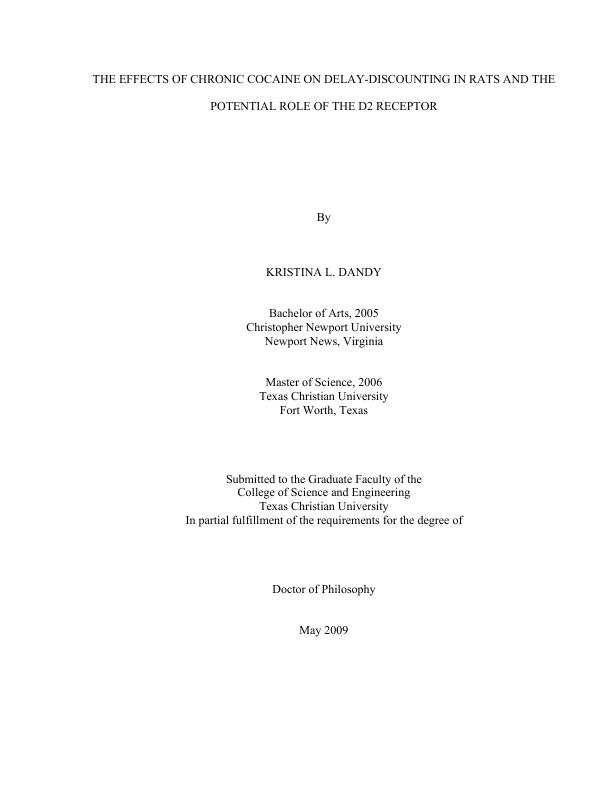The effects of chronic cocaine on delay-discounting in rats and the potential role of the D2 receptorShow full item record
| Title | The effects of chronic cocaine on delay-discounting in rats and the potential role of the D2 receptor |
|---|---|
| Author | Dandy, Kristina L. |
| Date | 2009 |
| Genre | Dissertation |
| Degree | Doctor of Philosophy |
| Abstract | The current study assessed changes in impulsive behavior as a result of chronic cocaine exposure and the potential role the D2 receptor played in mediating these effects. Findings were compared to predictions made by the matching law and the hyperbolic discount function. Twenty-four male Sprague-Dawley rats were exposed to a discrete-trials delay-discounting task in which they chose between a small reinforcer of 1 food pellet immediately and a large reinforcer of 3 food pellets after an adjusted delay (0, 10, 20, 40 60 s). Rats received daily injections of deionized water (DI) or cocaine (3, 7.5, 15 mg/kg) 5 min prior to the delay-discounting task for 9 consecutive days, followed by 14 consecutive days of testing in the absence of cocaine. Following testing, rats were euthanized and their brains removed in order to assess levels of D2 receptors in the nucleus accumbens (NAc) by means of a western blot analysis. All rats showed a decreased preference for the larger reinforcer as delay to the larger reinforcer increased. Repeated exposure to cocaine (7.5 and 15 mg/kg) further decreased preference for the larger reinforcer. When cocaine administration was discontinued, preference for the larger reinforcer returned to baseline levels in the 7.5 mg/kg group, but remained depressed in the 15 mg/kg group. Findings did not indicate a role of the D2 receptor in mediating these effects. Both the matching law and hyperbolic discount function provided a good fit for the data. These findings indicate that repeated exposure to cocaine dose-dependently alters impulsive behavior over time. Impulsivity remains when cocaine is no longer administered and recovery after high doses of cocaine occurs slowly, if at all. The D2 receptor is not involved in mediating these effects, suggesting that other biological mechanisms may account for changes in behavior. |
| Link | https://repository.tcu.edu/handle/116099117/4134 |
| Department | Psychology |
| Advisor | Gatch, Michael B. Barth, Timothy M. |
Files in this item
This item appears in the following Collection(s)
- Doctoral Dissertations [1485]
© TCU Library 2015 | Contact Special Collections |
HTML Sitemap



